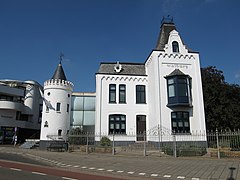Weert
Weert (Dutch: [ʋeːrt] ; Limburgish: Wieërt [wiəʀt]) is a municipality and city in the southeastern Netherlands located in the western part of the province of Limburg. It lies on the Eindhoven–Maastricht railway line, the A2 motorway and it is also astride the Zuid-Willemsvaart canal.
Population centres
- Weert (city):
- Boshoven (neighbourhood)
- Leuken (neighbourhood)
- Groenewoud (neighbourhood)
- Biest (neighbourhood)
- Molenakker (neighbourhood)
- Laarveld (neighbourhood)
- Moesel (neighbourhood)
- Graswinkel (neighbourhood)
- Keent (neighbourhood)
- Altweerterheide (village)
- Laar (village)
- Stramproy (village)
- Swartbroek (village)
- Tungelroy (village)
The city of Weert
Weert received city rights in 1414.
Weert is known for its indoor shopping centre called "De Munt," one of the largest in the south of the Netherlands. The inner city has many squares with cosy restaurants and terraces. Many well-known shopping brands are located in the city of Weert.
Furthermore, Weert is known for its large indoor and outdoor swimming complex known as "De IJzerenman," which includes slides, 5 swimming pools, and a lake.
Demographics
Languages
- Dutch in Weert is often spoken with a distinctive Limburgish accent, which should not be confused with the Limburgish language.
- Limburgish (or Limburgian) is the overlapping term of dialects spoken in the Belgian and Dutch provinces of Limburg. The Weert dialect is only one of many variants of Limburgish.
Transport
Railway station: Weert
Notable residents
- Willem van Heythuysen (1590s – 1650), cloth merchant
- Jan van der Croon (1600 – 1665), soldier and military commander
- Jan Dibbets (born 1941), conceptual artist
- Jan Koenderink (born 1943) physicist and psychologist
- Ton van Loon (born 1956), military commander
- Lucas Hüsgen (born 1960), writer
- Frans Weekers (born 1967), Dutch Politician
- Jeroen Lenaers (born 1984) Dutch politician and Member of the European Parliament
- Kelly Weekers (born 1989) Miss Nederland 2011
Sport
- Fons Steuten (1938–1991), cyclist
- Gonnelien Rothenberger (born 1968), equestrian
- Sjeng Schalken (born 1976), tennis player
- Manoe Meulen (born 1978), footballer
- Elbekay Bouchiba (born 1978), footballer
- Frank van Kouwen (born 1980), footballer
- Bjorn Hoeben (born 1980), cyclist
- Olivier Tielemans (born 1984), race car driver
- Pieter Custers (born 1984), archer
- Steef Nieuwendaal (born 1986), footballer
- Lisa Scheenaard (born 1988), rower
Sister cities
Weert is twinned with the following cities:
|
|
|
Gallery
-
Toren Martinuskerk - Weert
-
Roeivereniging Weert skiff stadsbrug
-
Weert-emmasingel
References
- ^ "mr. R.J.H. (Raymond) Vlecken" (in Dutch). Gemeente Weert. Retrieved 6 October 2021.
- ^ "Kerncijfers wijken en buurten 2020" [Key figures for neighbourhoods 2020]. StatLine (in Dutch). CBS. 24 July 2020. Retrieved 19 September 2020.
- ^ "Postcodetool for 6001GJ". Actueel Hoogtebestand Nederland (in Dutch). Het Waterschapshuis. Retrieved 4 December 2013.
- ^ "Bevolkingsontwikkeling; regio per maand" [Population growth; regions per month]. CBS Statline (in Dutch). CBS. 1 January 2021. Retrieved 2 January 2022.
- ^ Heijmans, Linda; Gussenhoven, Carlos (1998), "The Dutch dialect of Weert" (PDF), Journal of the International Phonetic Association, 28: 107, doi:10.1017/S0025100300006307, archived (PDF) from the original on 2014-06-06
- ^ Dutch Wiki, Lucas Hüsgen
External links
 Media related to Weert at Wikimedia Commons
Media related to Weert at Wikimedia Commons- Official website (in Dutch)



